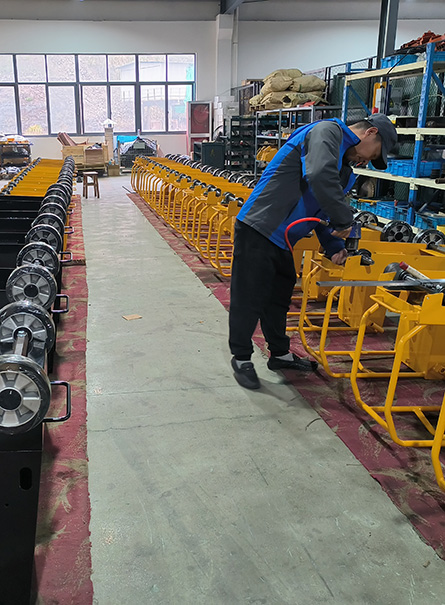The journey of selecting the right compaction equipment weaves through a maze of variables like compaction area dimensions and material type. Notably, asphalt plate compactors and roller compactors, though sharing a common goal, chart distinct courses due to their inherent design differences.
This discourse aims to illuminate the divergent traits of asphalt plate compactors and roller compactors, pinpointing where each shines brightest. Whether you’re a construction novice or eyeing a new addition to your compaction arsenal, this read aims to steer your decision with clarity.
Asphalt Plate Compactors
Asphalt plate compactors, or vibratory plate compactors, epitomize agility in the compaction realm. These nimble units, armed with a vibrating steel plate, excel in compressing granular soils and asphalt through rapid oscillatory movements.
Their prowess is most visible in the realms of modest-sized endeavors like pathways, residential driveways, and decorative landscaping. Their ease of operation and maneuverability render them a favorite among homeowners and small-scale contractors.
Features of Asphalt Plate Compactors
- Compact and mobile framework
- Vibratory mechanism adept at soil and asphalt compaction
- Optimal for limited-scale tasks and landscaping
- Operable by an individual
Roller Compactors
In contrast, roller compactors, or road rollers, stand as the titans of compaction equipment. These behemoths, with one or more metallic drums, are engineered to compact expansive areas of soil and asphalt. Their application spectrum spans from colossal road constructions to landfill shaping.
Features of Roller Compactors
- Robust, heavy-duty constitution
- Engine-driven for effective large-area compaction
- Equally adept at cohesive and non-cohesive soils
- Requires skilled operation
Differences Between Asphalt Plate Compactors and Roller Compactors
- Scale and Heft
Asphalt plate compactors are relatively diminutive and lightweight, offering ease in transport and agility in cramped spaces. Roller compactors, conversely, are bulkier and weightier, necessitating larger transport means.
- Compaction Technique
The vibratory nature of asphalt plate compactors is tailored for lighter compaction tasks, whereas the sheer force and mass of roller compactors suit them for more rigorous jobs.
- Material Compatibility
Asphalt plate compactors are the go-to for granular soils and asphalt but falter with cohesive materials like clay. Roller compactors, with their formidable weight and pressure, are versatile, handling both cohesive and non-cohesive soils adeptly.
- Scope of Application
Asphalt plate compactors are champions of smaller surfaces, not cut out for heavy-duty compaction. Roller compactors, in contrast, are well-equipped for larger expanses.
Applications for Asphalt Plate Compactors
- Compacting gravel and stone in driveways, patios, and walkways
- Establishing bases for pavers or concrete slabs
- Trench compaction prior to utility installation
Applications for Roller Compactors
- Extensive road construction and maintenance
- Landfill shaping and compaction
- Compacting varied soil types, including both cohesive (clay) and non-cohesive (sand and gravel)
- Choosing the Suitable Compactor
Your decision hinges on several factors:
- Material Type: Cohesive soils call for a roller compactor, while granular materials are a good match for an asphalt plate compactor.
- Project Scale: Small-scale projects benefit from the agility of an asphalt plate compactor, whereas larger areas are better served by roller compactors.
- Budget Considerations: Asphalt plate compactors are generally more budget-friendly and low-maintenance compared to their roller counterparts. However, for large-scale, intensive compaction needs, a roller compactor could be a more viable long-term investment.
Why Horizont Stands Out
Horizont Machinery, Inc. was established in 2003 and is a professional manufacturer of light construction machinery. Our expertise ensures you get the most suitable compactor for your specific requirements and budget constraints.
We pride ourselves on competitive pricing, excellent customer service, prompt shipping, and robust warranties, making us a reliable source for your construction equipment needs. Contact us at +86 16762215115 for more insights!
In Conclusion
To sum up, asphalt plate compactors and roller compactors each have their unique strengths, tailored for specific project needs. Consider material type, project size, and budget to make a well-informed choice. This guide aims to demystify the differences between the two types of compactors, aiding you in identifying the ideal machine for your project.


